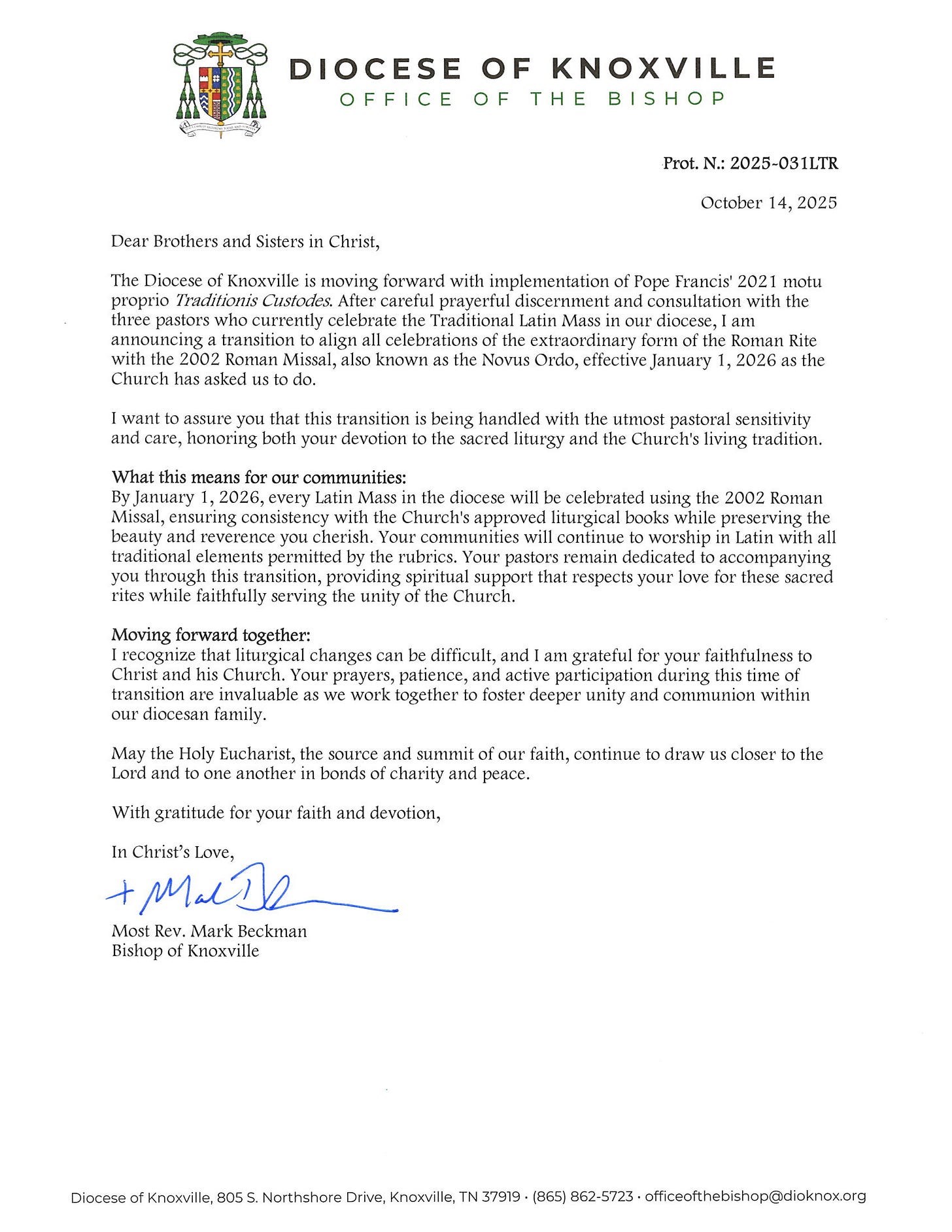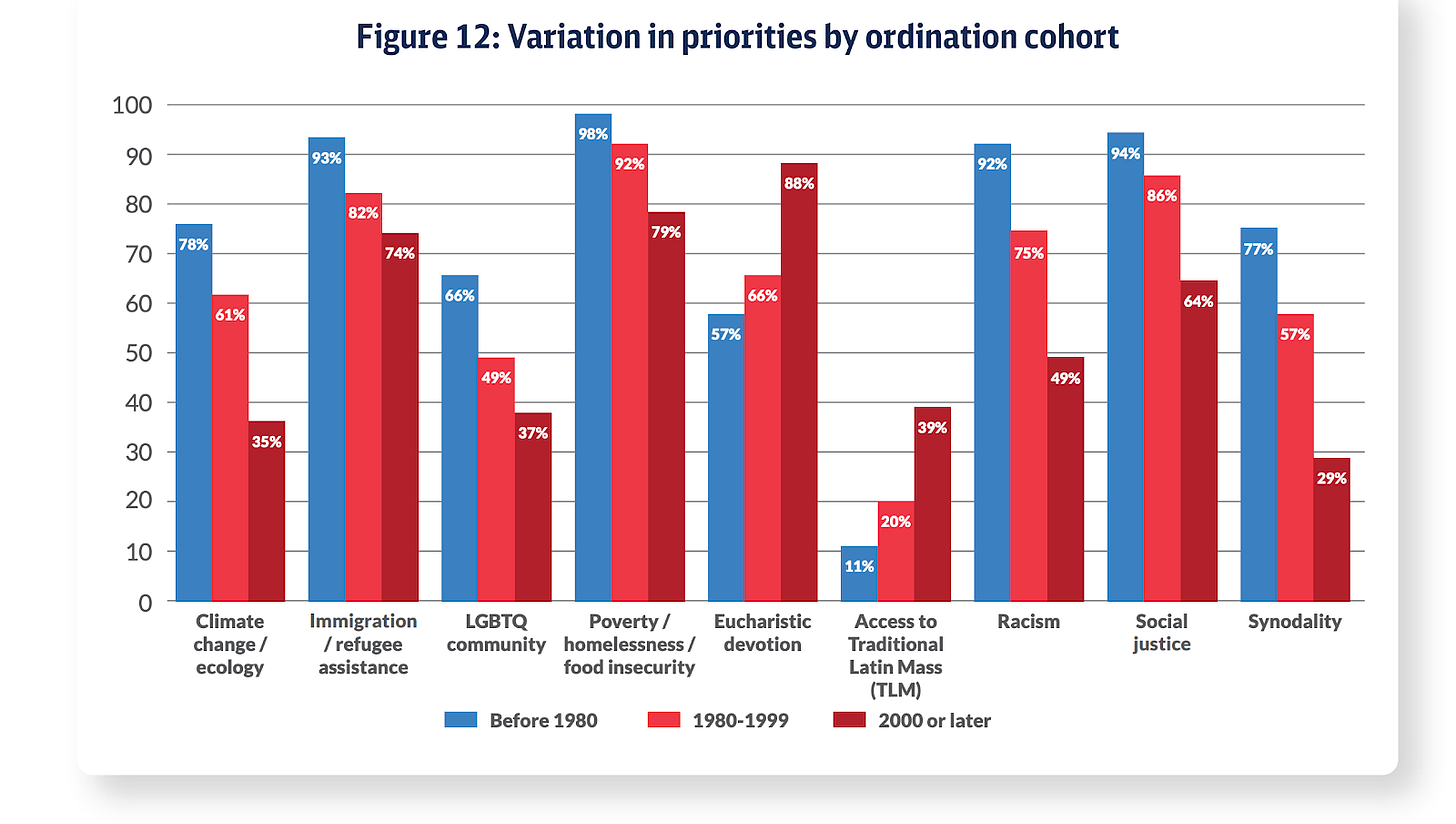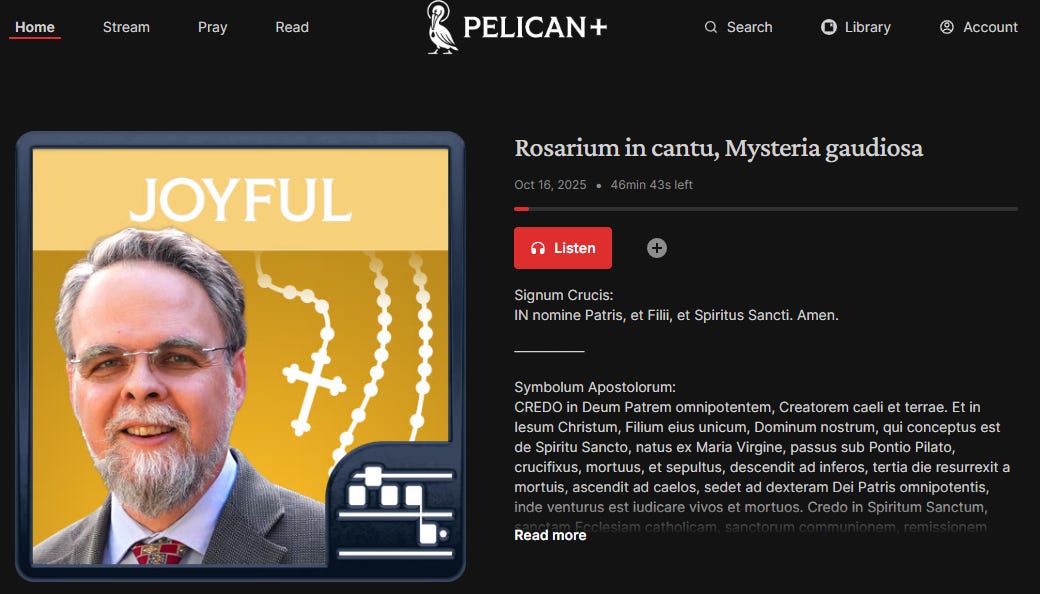Weekly Roundup, October 17, 2025
Knoxville blues; Stockholm Syndrome on steroids; Good news; Vatican Views; Cristeros; Questioning tongues
REMINDER: As of December 1, Tradition & Sanity will make its home at the newly-launched traditional Catholic media platform Pelican+. Between now and then, posts will be published at both places. After that point, the Substack will stay online but the full content will be over there. In this transitional phase, I encourage you to check out the new site. —PK
Although we need to start with the biggest news item of the week (which has many ramifications), I promise you that just below there’s a section devoted to genuinely good news, and a fair amount of it this week! We cover both sides here, as we are neither optimists nor pessimists but realists.
The Latest Casualty: Knoxville
“Moving forward together…”
Bishop Beckman of Knoxville has announced that all TLMs in the diocese will be discontinued as of the end of 2025. His official letter is a typical mash-up of fake compassion and mind-blowing ignorance:
As Rorate comments:
They really do think it’s about the “Latin” language in itself, and about the “smells and bells.” They really do think we are as vapid, and superficial, and malicious as they are.
Let us be clear for the 1000th time: it is about the RITE, the ancient rite, which you may call “form,” but it is ours, to which all Catholics of the Latin Church have “rightful aspirations” (John Paul II) — and, “in the meantime, it has clearly been demonstrated that young persons too have discovered this liturgical form, felt its attraction and found in it a form of encounter with the Mystery of the Most Holy Eucharist, particularly suited to them.” (Benedict XVI)
This was true in 1988, in 2007, AND IT IS EVEN MORE SO TODAY. Your new committee-made, “fabricated” liturgy is not what we inherited from our forefathers. It is not ours by history, culture, inheritance, and legacy:
“What happened after the Council was altogether different: instead of a liturgy fruit of continuous development, a fabricated liturgy was put in its place. A living growing process was abandoned and the fabrication began. There was no further wish to continue the organic evolution and maturation of the living being throughout the centuries and they were replaced — as if in a technical production — by a fabrication, a banal product of the moment.” (Joseph Card. Ratzinger)
We are not idiots, and WE ARE NOT GOING AWAY GENTLE INTO THAT NIGHT.
Well said!
A priest-friend writing to me about the kind of language often used to throw a sop to Catholics whose TLM is being wrenched from their communities (if never from their hearts):
I will be preaching this weekend using the Knoxville conundrum as my starting point, i.e., “the legitimate aspirations for transcendence, reverence, and beauty will continue to be honored.” But, aren’t ALL Catholics aspiring to these things? (Or supposed to be?) It’s like saying, “well, if you guys insist on aspiring to transcendence, we’ll be alright with that, but the rest of us will stay on a horizontal level.” Why in the world are we in the barque of Peter if we’re not seeking transcendence? Are we not heaven bound?
Fr. Zuhlsdorf reminds us of another thing Ratzinger said:
For fostering a true consciousness in liturgical matters, it is also important that the proscription against the form of liturgy in valid use up to 1970 [the older Latin Mass] should be lifted. Anyone who nowadays advocates the continuing existence of this liturgy or takes part in it is treated like a leper; all tolerance ends here. There has never been anything like this in history; in doing this we are despising and proscribing the Church’s whole past. How can one trust her at present if things are that way?
That was from God and the World: A Conversation with Peter Seewald (Ignatius Press, 2002), p. 416.
Fr. Z comments:
This is precisely right. However, there are bishops who do despise the Church’s whole past. They want the past erased and buried. They want a new morality, especially. That way they can be popular.
Popular with all the wrong persons… including demons, who are persons too.
Meanwhile, Leo XIV, on the occasion of his official visit to the President of the Italian Republic, Sergio Mattarella, October 14, 2025, spoke these words:
In this regard, there is a certain tendency these days to not appreciate enough, at various levels, the models and values that have matured over the centuries and mark our cultural identity, even sometimes claiming to erase their historical and human relevance. Let us not despise what our fathers have experienced and what they have passed on to us, even at the cost of great sacrifices.... Cherishing the memory of those who came before us and treasuring the traditions that have made us who we are is important for looking at the present and the future with awareness, serenity, responsibility, and a sense of perspective.
Hmmm… Seems like this could apply to the Church as a whole, no?
Faithful in Knoxville: you can file a petition against the implementation of the bishop’s policy, if you do so by October 28th. Here’s what Faithful Advocate says:
The Diocese of Knoxville now has an ACTIONABLE ITEM with the release, yesterday, of an official Protocol letter from Bishop Beckman. Ask him to rescind this Protocol. Please go to the main page of FaithfulAdvocate.org and you will see, in the left column, all the instructions given to the faithful in Charlotte. These apply in the same way to your situation. Please begin writing soon. You have 10 days from yesterday - by October 28th, via email (officeofthebishop@dioknox.org) or standard mail, to the Bishop.
The letter to which you are making reference is the one I included above, from the bishop; it is technically “Prot. N.: 2025-031LTR” and can be found here.
In “The Silence of Leo: Justice, the Latin Mass, and the Deepening Fracture within the Church,” Mark Lambert of Catholic Unscripted gives voice to the general feeling:
Justice is the moral virtue that consists in the constant and firm will to give their due to God and neighbour…. Those who attend the TLM are not rebels or separatists, but men and women who seek to be faithful to the Church as they have received her. They give their time, their devotion, and their financial support to diocesan life, often forming thriving communities of prayer and service. To cast them aside, to tell them that their devotion is no longer welcome, is to commit an injustice of the gravest kind….
Many of these faithful, who have spent years nurturing their love for the traditional liturgy, will now feel abandoned and betrayed by the very shepherds charged with their care. How can a Church that preaches accompaniment justify this kind of exclusion? Why is it that those who desire nothing more than to worship as their forebears did are treated as a problem to be solved rather than souls to be cherished? It is this contradiction that exposes the deeper spiritual malaise within the Church.
Stockholm Syndrome on steroids
Sadly, the rector of the basilica in Chattanooga, whom everyone who knows him considers a fine and holy priest, decided to lend himself fully to the bishop’s pogrom, as if he had undergone the worst Stockholm Syndrome on record. He preached a most offensive homily at last Sunday’s Mass called “Treasures New and Old,” and followed it up with a disgraceful “pastoral letter.” The combination of falsehood and tone-deaf accusation is simply breathtaking. Some examples:
He says the old placement of the Feast of Christ the King was arbitrary; evidently he hasn’t read the explanation Pius XI gave, nor does he seem to be aware that Paul VI did not so much move the feast as create a new feast, gutted of its original purpose (see this and this).
He repeats the usual talking points about how much better the new lectionary is, without of course noting that the readings are frequently edited for content, with “difficult” passages avoided; that the huge increase marks a loss of familiarity from repetition; and that the readings are no longer as well-suited to the immediate content of Eucharistic worship (see this and this).
He says that the SSPX is schismatic and warns the faithful against acting like Protestants—in spite of the fact that (irony alert!) many changes made to the Mass in the 1960s, in the vain pursuit of an antiquarian ecumenism, imitated what the Protestants did and do (see this, this, and this).
He suggests that devotees of the TLM are in danger of being “idolaters of a rite.” That is unworthy to say of anyone, most of all those who worship in the rite loved and prayed by countless saints.
He reduces the liturgy to a football of church authority.
He seems to think the only thing most Catholics care about is smells and bells, as if they were as superficial in their views as he appears to be.
And on and on. I will refrain from further comment. But there is no charity apart from truth. Truth cannot be sacrificed in the name of “unity” or “obedience.”
For a real Catholic account of the virtue whose fair name is so readily dragged through the mud by our gaslighting nomenklatura, read my little book True Obedience in the Church. Sophia has it on sale now for $5 (usual price: $14.95). An opportunity to pick up several copies and distribute them.
What does this latest cancellation portend?
Detroit. Jefferson City. Charlotte. Monterey. Knoxville.
There are too many in a row for this to be coincidental. Momentum is building to cancel diocesan TLMs once and for all. The Francis reign of terror continues.
And Leo is silent. He appears to do nothing. He is friendly to everyone, welcomes everyone. All who meet him come away saying “He will be good to us.”
At this point it is fair to say, on this issue, either Leo is weak, inadequate, timid, ineffective, uncertain, unable or unwilling to put the brakes on such bishops, perhaps out of a mistaken notion of synodality — or he personally agrees with the Bergogolian plan of diocesan liquidation and “transition to the unique form” but isn’t going to wear it on his sleeve, letting underlings do the dirty — similar to what Knoxville’s bishop made the rector do.
Leila Marie Lawler has a crystal-clear analysis of the Chattanooga affair which I commend to your attention. She highlights the psychological manipulation of priests by their bishops, who often use their men to do the dirty work on their behalf.
Indeed, coincidentally, over at Crisis Magazine Kevin Wells wrote a must-read article about “The Unspoken Trial of the Orphaning of Our Priests.” You can see it and hear it in the communications from priests who are made to suffer by those who should be their supportive fathers.
The Roman Catholic Church is facing a spiritual epidemic unlike any it has ever known; it is as large—and mostly unrecognized —as any crisis in today’s American Catholic Church: Beneath the weight of what might best be described as a priestly anti-fatherhood episcopate—bishops who relate to their priests not as spiritual fathers, but as absent or even abusive ones—countless priests in America are left to live their vocations in silent despair. Burdened by anger, isolation, depression, and the tormenting fear of episcopal reprisal, countless priests’ joy has been stolen away, leaving behind only shadows of the men they once prayed and hoped to become.
A real danger
Some people have asked me if I think that the Vatican’s policy going forward will be to try to eliminate the TLM by substituting for it a “unicorn” Novus Ordo — that is, one done in Latin, with chant and incense, ad orientem, etc. Yes, I think this is certainly what some of the Cranmers and Cromwells of our day (read: Card. Roche & Co.) would very much like to see.
A reader wrote to me:
My fear is this latest move by the Vatican might just be the “check” or even “checkmate” on the chessboard battle of the TLM vs the Novus Ordo. Why? In my experience, over half the folks in our TLM community do not use a missal. And if you haven’t got a missal, you won’t have any idea how different the prayers are between the two; and if Scripture is read, well, it’s still the same Scripture (so they think). If priests start saying the Novus Ordo ad orientem, use some Latin, chant, and incense, are all the TLMers going to notice how different it still is? I also fear this may be the division of the traditionalists and will be done for that reason. The modernists and their lackeys will not let go of the Mass of Paul VI. So they think, “If the people want chant, and incense, and reverence, we can do that — if that’s what it takes to get rid of the TLM once and for all.” The ones that will really know the difference are a smaller minority within an already small minority of Catholics. As Jesus said, “a house divided cannot stand.”
I have no fear that this will be a checkmate, but I do think my reader is right that we should be on our guard. This is a time when lovers of the TLM need to band together to defend what must be defended, to educate themselves and spread information about the differences between the rites (regardless of their externals), and to remain true to the heavenly treasures God has inspired in His Church over the course of two millennia.
Admittedly, there’s something quite depressing about having to hear rehashed, every couple of years, all the same stale slogans about how great the Novus Ordo is finally going to be, now that we “must” say goodbye to the traditional Latin Mass.
This has been going on now for, oh, 55 years.
Even though every argument has been refuted a thousand times, and experience is worth a thousand arguments, it seems to make no difference with officialdom. They continue to bumble ahead into the bright future, leaving a trail of wreckage.
Be strong. Be sagacious. Be salt.
Good News
Just as the Church on earth is a mixture of wheat and tares, sheep and goats, shepherds and wolves, so there is always going to be a mixture of good news and bad news. Fallen man has a tendency to fixate on the bad and to overlook or downplay the good; we see this in the virality of social media posts about what is evil compared to the rather lame performance of posts about what is good. I try my best to share good news that comes my way.
True shepherds of souls
News from California:
Saturday, Nov. 1st at noon, the archbishop will celebrate a Solemn Pontifical Mass (MR 1962) at Star of the Sea in San Francisco. I hope you will plan to join us in worshipping God on the Feast of All Saints! The Archbishop’s Schola will sing the Byrd Mass for 4 and motets by Bruckner and Stanford, alongside lovely improvisations at the organ by Christopher Berry. The Mass will be preceded by a procession from the Cathedral to Star of the Sea. Please help us spread the word about this beautiful opportunity — we look forward to seeing you there!
In spite of the bad news, remember that some of our bishops actually love Catholic tradition. All of them should, but in 2025, I’m happy if some of them do! I heard from three bishops who praised my Pints with Aquinas interview. I know two other bishops who will be doing Solemn Pontifical Masses (and they are not “the usual suspects” either).
Pilgrimages on the up and up
Thomas Colsy, in “The Rise and Rise of the Traditional Latin Mass Pilgrimage”:
Resurrected pilgrimages to some of the oldest Catholic nations’ most significant spiritual sites are continuing to surge in popularity among devotees of the Traditional Latin Mass.
It’s quite something to behold. Every year, Europe’s ancient landscapes, where the Faith’s echoes linger in stone and song, the countryside moves with burgeoning numbers of (predominantly young) traditional pilgrims. The surroundings become marked by the soft cadence of prayers and the tread of pilgrims’ feet, in between the bellowing of folk songs and chant.
Leading the way are France, Spain, and England. For consecutive years now, their most prominent Catholic pilgrimages which celebrate according to the ancient rite have continued to grow. This year, 2025, proved no exception — and record numbers were recorded all around.
Demographic shifts
The intensifying attack on tradition has one and only one explanation: the desperation of the older generation as they see their revolution crumbling. They want to continue the iconoclasm against the liturgy in order to prevent a restoration of the true icon, the traditional rite. They know their time is ticking. At Rorate, we read about new data just in:
39% of priests in the United States ordained after the year 2000 consider access to the Traditional Latin Mass a priority — 1in 4, compared with just 11%, or 1 in 10, for priests ordained before 1980. The numbers come from this study (“Morale, Leadership, and Pastoral Priorities: Highlights from the 2025 National Study of Catholic Priests”), published today by The Catholic Project of the Catholic University of America (CUA). It is quite astonishing, and a clear trend.
Traditional monastery in Sweden
Here is some great news: the first Benedictine monastery in Sweden since the Reformation, one, moreover, devoted to the traditional Roman Rite, has been aided by the diocese of Stockholm to obtain an ideal monastic property. You can read more here and here.
I encourage you to support this budding community with your tithing donations (I have done it too, so I put my money where my mouth is!).
New traditional monastery in France
The old-rite Benedictine monks of Le Barroux, always a flourishing community, are taking over a dying Trappist monastery. There are now multiple preexisting monasteries that have been assimilated to either Le Barroux or Fontgombault. The life is with the traditional communities.
Chanting the Rosary
I recorded the chant for the Joyful Mysteries of the Rosary in Latin; it was released yesterday on Pelican+. You can find it here. Each decade is preceded by a short antiphon about the mystery, which then establishes the Gregorian mode for the following decade. This provides a pleasing combination of repetition and variety.
Healthy recreation
A short video has been released about the annual Jane Austen dances being held in Steubenville. The next one’s coming up tomorrow, October 18th! More info here.
Well, look at this
The three episodes of the Mass of the Ages trilogy are now available on DVD!
When I reflect on this trilogy, I think: “What an epic accomplishment.” The episodes taken together have been viewed by MILLIONS of people. A huge impact. Catholics everywhere learned that our movement had deep roots, all across the world, among ordinary folks as much as scholars. We saw the unstinting dedication in the face of incomprehension and contempt. We saw the heavenly beauty of the old rite, which crushes committee products to dust. There is something incredible about the creation and success of these three films. I am humbled and honored to have played a small part in them.
I remember when the team came to film in my home, our cat Weezer was surprised that he couldn’t just hang out with the AV team. We had to put him in the garage.
Vatican Views
A new job for Cupich
Some are making a big fuss over this latest piece of news:
Pope Leo XIV has appointed Chicago Archbishop Cardinal Blase Cupich to the Pontifical Commission for Vatican City State, the Holy See said on Wednesday. The Vatican made the announcement via a press release on Oct. 15. The commission functions as the legislative body of Vatican City. In addition to managing the many functions and activities of the Vatican City government—including security and public order, public health and the environment, economic activities, postal and customs services, and numerous other internal concerns—the commission also oversees the artistic complex of the Vatican Museums and their assets. Laws proposed by the commission must be approved by the Holy Father.
I would only remind everyone that this position is like being appointed to a city mayor’s council. It’s largely administrivia, as the list above indicates, having to do with the Vatican City as a (tiny) political entity. To me, it looks like the same kind of step the pope made with Cardinal Tagle, namely, “promoveatur ut amoveatur”: you “promote” someone (or what amounts to the same, fatten his portfolio with new busywork), in order to get him out of the way or lessen his impact elsewhere.
If you follow church politics over the centuries, you see that moves like this are not always what they appear to the superficial eye. I’m not saying I know, I’m only reminding people to think strategically.
Dilexi Te
Gaetano Masciullo pens an important and interesting reflection on the pope’s new apostolic exhortation. Summary: too much Pelagianism, not enough grace.
Cardinal Sarah
In a new interview, Cardinal Sarah speaks about the TLM:
Why do we have to fight? Why forbid this? Why forbid that? Who gives us this right? Who gives us this power? Someone who has a personal relationship with God? We’ve never seen this in the history of the Church....
How we believe is how we pray. If we don’t have faith, we can’t take action. If people don’t believe, nothing will change. We continue to fight over the liturgy, we continue to bully certain people [i.e., the traditionalists]. Whereas in fact, when we really look at the Christians who practice today, they are the ones who go to traditional Mass. So why forbid them? On the contrary, we should encourage them.
I don’t know what the Pope will do, but he is aware of this battle. He is aware of this difficulty.... The Pope is the father of everyone, of each one of us. He is the father of the traditionalists. He is the father of the progressives, the father of everyone. He cannot ignore his children. Everyone has their own character, their own sensibilities. Everyone must be taken into account. I think he will try to act in this way.
Libero Meloni
Edward Pentin: “Libero Milone Takes His Case to Vatican City’s Supreme Court.” Tremendous. I had the opportunity on one special occasion to hear Libero lay out exactly what happened to him. It’s unbelievable the corruption, obstruction, threats, and mafia-like behavior he faced under Francis simply trying to figure out and straighten out the Vatican’s finances. You can find out about that here.
China throws Vatican under the bus
An object lesson in suicidal diplomacy. In this regard, Pius XII was vastly more realistic. Will Leo have the courage to end this foolish pact once and for all?
It appears that once again, Beijing has delivered another blow to the Holy See by consecrating a bishop to the pivotal Diocese of Shanghai after he was elected during the papal sede vacante. On October 15, Father Wu Jianlin will be consecrated as auxiliary bishop of the Diocese of Shanghai. News of the ceremony came via official notices issued by the schismatic state-approved church, the Chinese Catholic Patriotic Association (CCPA). Previously vicar general of the diocese, Wu was elected, effectively unopposed, in a vote on April 28. The next day another priest, Father Li Janlin, was similarly “elected” as auxiliary bishop of the Diocese of Xinxiang, reportedly being the sole candidate.
Since the signing of the controversial Sino-Vatican deal in 2018, China has appeared to hold the reins and the Holy See has repeatedly been left playing catch up. This instance, it appears, is no different. Fr. Wu’s election to the episcopate came days after Pope Francis’ death, meaning that there was no capacity for the pope to give the necessary approval, which is believed to be part of the process of the still secret deal.
Hyperpapalism continues
Edward Feser, author of the definitive treatment of the death penalty in Catholic history and theology, has authored a refutation of a recent interview between Robert Fastiggi and Suan Sonna on the death penalty. No argument can stand after Feser’s axe smites it.
Reacting to the same interview, Erick Ybarra’s essay “Dr. Robert Fastiggi on the Death Penalty” is bracing, and what he says in the last paragraph just about made me fall off my chair; I had not realized the extent to which Fastiggi seems to be departing from the Catholic Faith.
Let’s not forget who the fomenters of division in the Church really are, as Edward Pentin reminds us: “Exposing the Lie that Upholding Apostolic Tradition and Sound Doctrine Causes Division and Disunity.”
Encounter the Cristeros as never before
Os Justi Press has released its latest book — one of the most thrilling titles ever to enter its catalog: The Cristero Counterrevolution and the Battle for the Soul of Mexico.
Published in multiple bestselling Spanish editions and now finally available in English for the conflict’s centenary in 2026, Fr. Javier Olivera Ravasi tells the harrowing tale of the Cristeros War as seen through the eyes of its immediate protagonists on both sides — a story of unbelievable wickedness, corruption, and brutality, opposed by unprecedented Catholic action, bravery, and sacrifice. A tale of simple men, women, and children who fought for their country, their faith, and their heavenly King. A tale of talented young intellectuals who debated just war with bishops and the pope. A tale of martyrs from all walks of life who died with “Long live Christ the King and the Holy Virgin of Guadalupe!” on their lips.
Quite apart from its value as a detail-rich account of an important but poorly known civil war, the parallels to our present situation are numerous and seem to be increasing day by day. The Cristero Counterrevolution thus possesses more than mere historical interest; it is a case study in political action, organized resistance, and Catholic reconquest, as well as a case study of the limits of political and ecclesiastical authority. Find out for yourself why Fr. Ravasi’s book is widely considered the finest one-volume treatment of the subject ever written.
316 pp. Copiously illustrated. Paperback, hardcover, or ebook. (“Look inside” at Os Justi Press or Amazon.)
¡Viva Cristo Rey!
Canon Altiere and Canon Gardner of the Institute of Christ the King have recorded four podcasts on topics raised by and in the encyclical Quas Primas of Pope Pius XI — the document that initiated the feast of the Kingship of Jesus Christ exactly 100 years ago. The first episode may be found here.
Along the same lines, I have a new book coming out very soon, just in time for this anniversary. Entitled His Reign Shall Have No End: Catholic Social Teaching for the Lionhearted and published by XIII Books (an imprint of Arouca Press), I promise it will not fail to instruct, entertain, challenge, and provoke in equal measures!
Two other political pieces
Christopher Barca, “When Will Catholic Pastors Take Security Seriously?”:
When the news came out about the deadly shooting at a Catholic church in Minneapolis, I felt more than just sadness and anger. I had a grim sense of inevitability. For years, I have offered my help to improve security at Catholic parishes; and for years, pastors have either politely declined or simply ignored me.
Now, after another attack—this time at a Mormon church in Michigan, I find myself wondering which Catholic parish will be next. These tragedies are not isolated incidents. They show a troubling trend: houses of worship across the country are increasingly targeted, and Catholic churches are mostly unprepared.
There should be armed, well-trained, well-coordinated men at every Mass. Simple as that. As John Mac Ghlionn argued here a few weeks ago.
Robert Lazu Kmita, “Saint Thomas Aquinas and his Challenging Political Philosophy”:
The great challenge, then, is the relevance of his thought: can the main ideas of ‘De Regno’ still be brought into the public forum? Personally, I believe they can.... For Saint Thomas there is no doubt: kingship is the best possible political system. It best reflects the structure of all creation—both visible and invisible—which is governed by a supreme King: God. Thus, monarchy is, at the political and social level, an “icon”—an analogical reflection—of the whole of creation. This is another idea that demands serious reflection from Catholics. »
Questioning tongues
Blosser’s and Sullivan’s scholarship in their new book Tongues through Church History is massive and conclusive. As reviewed by Phillip Campbell:
The overarching question ... is whether anyone in Church history believed that the gift of tongues consisted in a miraculous “heavenly” prayer language that was indiscernible to human reason, akin to how it is conceived of and practiced in Charismatic circles today.
The answer is a resounding no. Blosser and Sullivan’s study demonstrates beyond any doubt that the consensus of Christian tradition is that the miracle of tongues was always conceived of as rationally speaking a previously unlearned human language, not as a personal language of prayer and praise that is rationally indiscernible to the hearer. In fact, in the authors’ wide study of medieval and patristic sources, we do not find so much as one father, doctor, or saint who holds anything close to the Charismatic-Pentecostal view of tongues. All sources East and West unanimously agree that the miracles of tongues consists in speaking previously unlearned human languages....
Despite this conclusion, one would be mistaken to consider this a polemical work against Charismatic Christians. Its tone is entirely scholarly (when I say scholarly, I mean there are multiple pages about how to translate specific Greek verbs); and as in Volume 1, the authors insist that the work is not an “attack” on Charismatics, nor is it suggestive that the modern day charismatic experience does not have positive value for those who engage in it. Blosser and Sullivan are, however, insistent on the point that what passes for tongues today is certainly not how tongues was understood by the medievals and patristics.
To be honest, I’m not sure how, given that conclusion, it is possible to defend the Charismatic movement. But I will leave the actual polemics to my friend Kennedy Hall, whose book Charismania: The Truth About the Charismatic Renewal tells a disturbing story.
Good news for European readers
Pelican+ is now available in the Apple App Store in Europe. As we continue building a platform that honors our Catholic worldview, we hope this app will serve as a convenient resource for users around the world. To get started, simply download the app from the App Store, then visit app.pelicanplus.com to sign up for your subscription. Once you’ve completed your subscription, you’ll be able to log in to the app on your phone and begin exploring. We’re excited to welcome our European community.
Thank you for reading, and may God bless you!










“In my experience, over half the folks in our TLM community do not use a missal. And if you haven’t got a missal, you won’t have any idea how different the prayers are between the two; and if Scripture is read, well, it’s still the same Scripture (so they think). If priests start saying the Novus Ordo ad orientem, use some Latin, chant, and incense, are all the TLMers going to notice how different it still is?”
I’m going to be vulnerable here at the risk of putting myself out here as someone who may be regarded as being woefully ignorant or “not caring enough,” but I just wanted to say that the quote above may be pointing to someone like me! 🫣 I feel a bit embarrassed saying that. I’ve been Catholic for 3 going on 4 years, coming from 20 years in the Protestant world I read my way into the church, and from a distance I was immediately drawn to the beauty of the Latin mass (though I do have to say that I attend a N.O mass and my very first mass ever was the N.O and I was SO struck by the beauty of the prayers. I know TLM’ers might not understand that, but I had no idea that Catholics prayed like that. And of course it was in English, so I could understand it). I have no educational background that gave me exposure to Latin at all. I only have a high school diploma and worked as a hair stylist. I’m not an academic though I love to read theology. But the BEAUTY of the TLM (what, yes, is the “smells and bells”) made me so hungry for something deeper and more. Mystery. Drama. Beauty. Essentially, God. But worship of God in a way so, so foreign to my experience up to that point, even though I have a very intimate relationship with Jesus. But when I read the articles here on this Substack I have to admit some of it goes academically beyond what I even have time to delve into as a busy wife, mom, and business owner. I feel ashamed to admit to the readers of this Substack that it probably *would* be “good enough” for me if we did just give Latin “pride of place,” introduced chant and sacred music, incense, altar rails, candles, a priest facing ad orientum, etc. It would be “good enough” because we don’t even have anything CLOSE to that at our parish! It sounds absolutely amazing to just have that! 😂 I continue to read and study about the TLM (your books are very helpful), but again at the risk of sounding dumb, sometimes I feel like I’m just not smart or intellectual enough to fight for the TLM, and I would be satisfied with what TLM’ers would probably consider wrong, incomplete and insubstantial. Do you have any advice for someone like me who feels very “called out” by the concern of the man quoted above? Am I doing something wrong by just longing for SOMETHING more? Thank you!
Can we still get expect a transition email to Pelican+? Thanks.